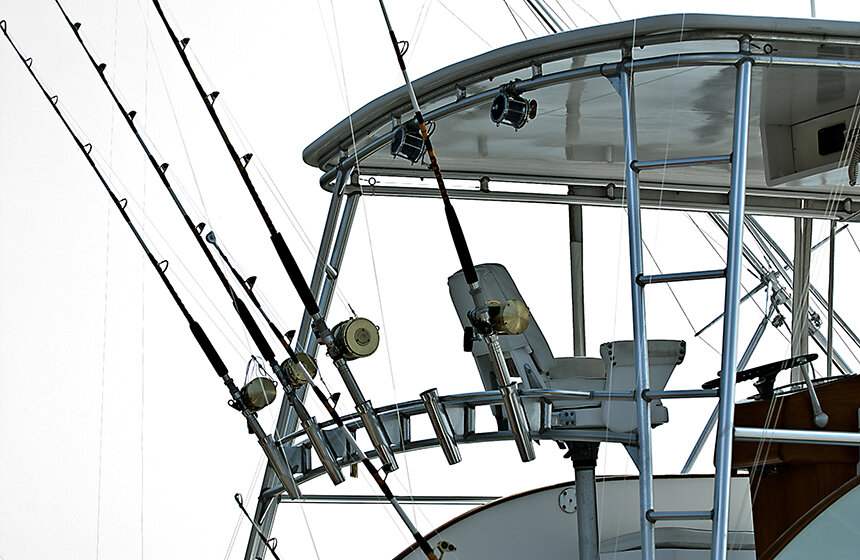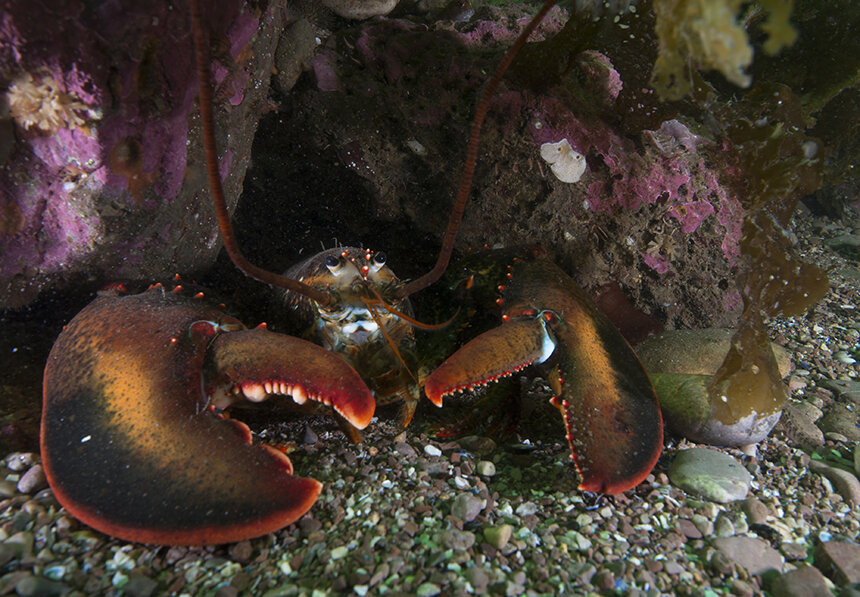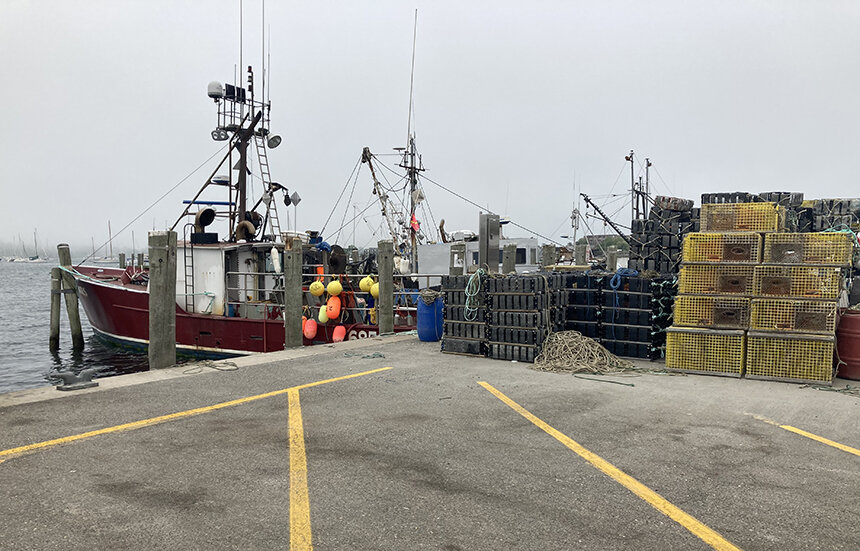RI’s warming waters force iconic species out, disrupt catch limits and change ecosystem
By FRANK CARINI/ecoRI News staff
For generations, winter
flounder was one of the most important fish in Rhode Island waters. Longtime
recreational fisherman Rich Hittinger recalled taking his kids fishing in the
1980s, dropping anchor, letting their lines sink to the bottom, waiting about
half an hour and then filling their fishing cooler with the oval-shaped,
right-eyed flatfish.
Now, four decades later,
once-abundant winter flounder is difficult to find. The harvesting or
possession of the fish is prohibited in much of Narragansett Bay and in Point
Judith and Potter ponds. Anglers must return the ones they accidentally catch
to the sea.
Overfishing is easily
blamed, and the industry certainly bears responsibility, as does consumer
demand. But winter flounder’s local extinction isn’t simply the result of
overfishing. Sure, it played a factor, but the reasons are complicated, from
habitat loss, pollution and energy production — i.e., the former Brayton Point
Power Station in Somerset, Mass., pre-cooling towers, when the since-shuttered
facility took in about a billion gallons of water daily from Mount Hope Bay and
discharged it at more than 90 degrees Fahrenheit.
The climate crisis,
however, is likely playing the biggest role, at least at the moment, by
shifting currents, creating less oxygenated waters and warming southern New
England’s coastal waters. These impacts, which started decades ago, have and
are transforming life in the Ocean State’s marine waters. The changes also
impact ecosystem functioning and services. There’s no end in sight, as the type
of fish and their abundance will continue to turn over as waters warm.
Rhode Island’s warming water temperatures are causing a biomass metamorphosis that is transforming the state’s commercial and recreational fishing industries, for both better and worse. The average water temperature in Narragansett Bay has increased by about 4 degrees Fahrenheit since the 1960s, according to data kept by the University of Rhode Island’s Graduate School of Oceanography.
Locally, iconic species
are disappearing (winter flounder, cod and lobsters), southerly species are
appearing more frequently (spot and ocean sunfish) and more unwanted guests are
arriving (jellyfish that have an appetite for fish larvae and, in the summer,
lionfish, a venomous and fast-reproducing fish with a voracious appetite).

A changing climate has local charter boat captains and recreational anglers looking for different fish to catch, such as black sea bass. (istock)
He said the type of fish
in Rhode Island’s marine waters today is much different than a decade ago. He
pointed to the impact of a changing climate. Warm-water fish such as black sea
bass, summer flounder and scup are here in abundance, according to Monti. These
species are now an integral part of his charter business.
“It would have been
unheard of 10 years ago to say black sea bass would be so abundant in our
waters, and that it would be a big part of my charter business,” Monti said.
This transfer of fish
along the Atlantic Coast is having an impact on commercial fisheries, most
notably regarding the issue of assigning stock allocations.
For example, Monti noted
that summer flounder moving north has created havoc with catch limits. He said
Mid-Atlantic vessels, which possess the summer flounder quotas but now have
fewer of the fish in their waters, have moved up the East Coast to fish. New
England boats now have the fish in their waters but little allocation.
He said the laws that govern
commercial fishing need to keep up with the impacts of the climate crisis. He
also noted that as warming waters change the type and abundance of fish in
different regions, commercial fishermen have to retool their boats and gear and
learn how to catch the species new to their waters.
Hittinger, first vice
president of the Rhode Island Saltwater Anglers Association, attributes the species changes he has
witnessed in local waters, at least in part, to rising water temperatures.
When the Warwick
resident started fishing regularly more than four decades ago, Hittinger said
he caught cod and pollack off Block Island and winter flounder in all of the
state’s bays. He noted that most of these fish are largely gone, replaced by
warm-water species.
Speaking as a
recreational angler, Hittinger said the changing of the species found in Rhode
Island’s salt waters isn’t necessarily his concern. His concern lies with
regulation that is slow to change with the times. He used black sea bass as an
example, noting that Rhode Island’s recreational fishing restrictions on the
species, implemented by the Mid-Atlantic Fishery Management Council, were set
20 years ago. Now, he said, there are a lot more of them.
Black sea bass caught in
Rhode Island waters must be at least 15 inches in length and the annual limit
is 10 per angler. Hittinger noted that in New Jersey, where the fish is becoming slightly less
plentiful, keepers must be at least 12.5 inches and the annually catch limit is
more than three times higher.
As the waters off the
East Coast continue to warm, the Mid-Atlantic Fishery Management Council and the New England Fishery Management Council will likely be hearing similar concerns.

To escape the heat, Rhode Island lobsters are moving northward and into deeper waters to keep cool. (istock)
Hale noted that if your
preferred habitat was warming to a level you found intolerable, you would
basically have three choices: adapt (install an air conditioner, for example);
move to a cooler locale (say Maine); or stay where you are and suffer the
consequences (heat exhaustion, heat stroke, death).
He said many of the
planet’s other species can only exercise the second option, while others are
stuck with the third.
Along the East Coast
numerous marine species, including bottom-dwelling invertebrates such as clams,
snails, crustaceans and polychaete worms, have shifted their ranges poleward in
response to rising water temperatures caused by the global climate crisis.
Cold-water species such as cod, winter flounder and American lobster are moving
to cooler locales.
Hale said species are
trying to maintain their preferred thermal niche by moving poleward or into
deeper water.
The Saunderstown
resident, who retired from the EPA in 2018 after 23 years at the Narragansett
lab, co-authored a 2017 study that covered two biogeographic provinces along
the Atlantic Coast: Virginian, Cape Hatteras, N.C., to Cape Cod; and Carolinian,
mid-Florida to Cape Hatteras.
The authors found that
bottom water temperature increased 2.9 degrees Fahrenheit from 1990 to 2010.
They also noted that the center of distribution of 22 out of 30 species studied
shifted north in response to increasing water temperatures. Seven species
shifted south, but moved just one-third the distance of the northward-movers.
“Fishermen are
adaptive,” said Monti, a strong supporter of renewable energy development to
address the climate crisis. “Every day is different with tides, currents, wind
and bait. Warming waters and climate change are just additional factors.
Regions are losing and gaining fish. It’s not going to end.”
